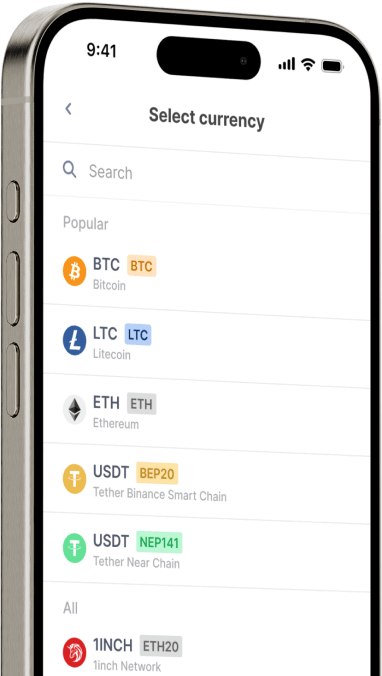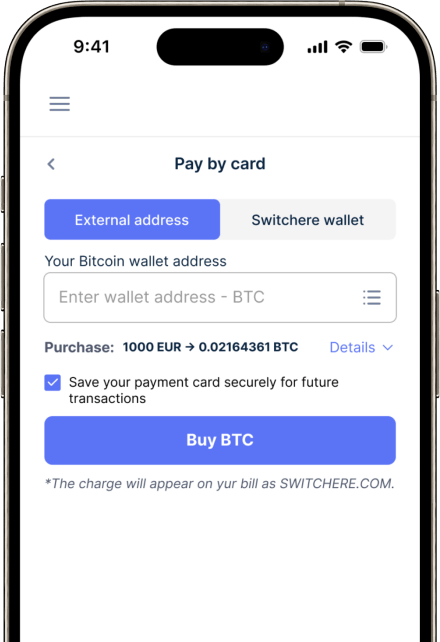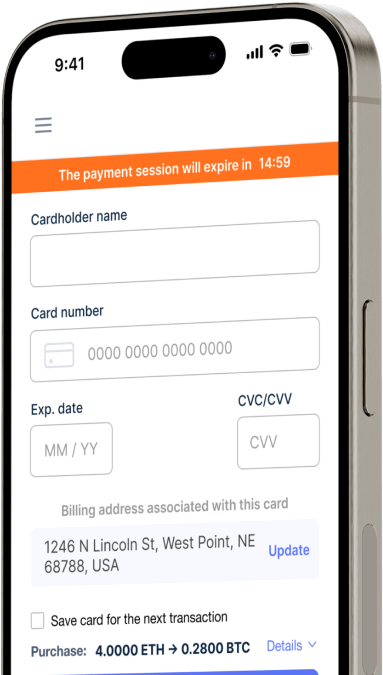Convert
Israeli New Shekel (ILS) to Binance USD (BUSD) Instantly
Purchase Binance USD (BUSD) with Israeli New Shekel (ILS) easily at Switchere and benefit from fast, secure transactions.
About
Binance USD (BUSD)
BUSD (BUSDBSC) is a regulated, fiat-backed stablecoin pegged 1:1 to the US dollar, designed to provide price stability within the volatile digital asset landscape. Issued by Paxos Trust Company in partnership with Binance, BUSD aims to offer a reliable medium of exchange and store of value. The "BUSDBSC" ticker specifically denotes its presence as a BEP-20 token on the BNB Smart Chain, a high-performance decentralized network facilitating extensive DeFi applications. The core technology behind BUSD relies on transparent, audited US dollar reserves held in dedicated accounts, ensuring each token is backed by an equivalent amount of fiat currency. This contrasts with algorithmic stablecoins, offering a different approach to maintaining its peg and cryptographic security.
The primary utility of BUSD, particularly its BUSDBSC variant, is to enable seamless transactions and participation in the BNB Chain's ecosystem with minimal price risk. Its tokenomics are straightforward: new BUSD is minted when dollars are deposited with Paxos, and burned when redeemed, maintaining the 1:1 backing. Prominent use cases include trading against other cryptocurrencies on exchanges like PancakeSwap, serving as collateral in lending and borrowing protocols, yield farming within various DeFi applications, and facilitating peer-to-peer payments. As an NYDFS-approved (for the Paxos-issued Ethereum version) and widely adopted stablecoin, BUSD plays a significant role in providing liquidity and a trusted, compliant digital dollar representation on various blockchain technology platforms, acting as a foundational element for many Web3 infrastructures and on-chain financial activities.
Buy Other 150+ Cryptocurrencies for Israeli New Shekel (ILS)
Other Coins for Israeli New Shekel (ILS)
-
ILS to 1INCH
-
ILS to AAVE
-
ILS to ACH
-
ILS to ANKR
-
ILS to APE
-
ILS to AUDIO
-
ILS to AVAX
-
ILS to AVAX
-
ILS to AXS
-
ILS to BAT
-
ILS to BNB
-
ILS to BUSD
-
ILS to BONE
-
ILS to CELR
-
ILS to CELO
-
ILS to LINK
-
ILS to CHZ
-
ILS to COMP
-
ILS to CVX
-
ILS to CRV
-
ILS to DAI
-
ILS to DASH
-
ILS to MANA
-
ILS to DGB
-
ILS to LEASH
-
ILS to DYDX
-
ILS to XEC
-
ILS to EOS
-
ILS to ETC
-
ILS to ENS
-
ILS to ETHW
-
ILS to FET
-
ILS to GNO
-
ILS to HOT
-
ILS to ILV
-
ILS to IMX
-
ILS to JASMY
-
ILS to KNC
-
ILS to LDO
-
ILS to LPT
-
ILS to MKR
-
ILS to MASK
-
ILS to NEXO
-
ILS to NMR
-
ILS to OMG
-
ILS to ONT
-
ILS to OP
-
ILS to CAKE
-
ILS to DOT
-
ILS to POL
-
ILS to QNT
-
ILS to XRD
-
ILS to RPL
-
ILS to SHIB
-
ILS to SKL
-
ILS to STG
-
ILS to XLM
-
ILS to STORJ
-
ILS to SUSHI
-
ILS to SNX
-
ILS to USDT (BEP20)
-
ILS to USDT (ERC20)
-
ILS to USDT (Polygon)
-
ILS to USDT (SPL)
-
ILS to USDT (TRC20)
-
ILS to XTZ
-
ILS to SAND
-
ILS to THETA
-
ILS to TWT
-
ILS to UNI
-
ILS to USDC (ERC20)
-
ILS to USDC (TRC20)
-
ILS to USDC (SPL)
-
ILS to USDC (Polygon)
-
ILS to USDC (BEP20)
-
ILS to VRA
-
ILS to WOO
-
ILS to WBTC
-
ILS to WMINIMA
-
ILS to YFI
-
ILS to ZIL
How to Buy Binance USD (BUSD)
Frequently Asked Questions
-
What does the ILS/BUSD trading pair represent in the digital asset market?
The ILS/BUSD pair is a fiat-to-crypto gateway, allowing users to convert Israeli Shekels (ILS) directly into Binance USD (BUSD). BUSD is a regulated stablecoin pegged 1:1 to the US dollar, issued by Paxos and approved by the NYDFS. This pair provides a stable entry point into the crypto ecosystem for users with ILS, bypassing the volatility of other digital assets for initial purchases.
-
What are the advantages of holding BUSD after converting from ILS?
Holding BUSD provides a stable store of value on the blockchain, shielding you from market volatility. As both a BEP-20 and ERC-20 token, BUSD offers vast utility across DeFi protocols for activities like yield farming, lending, and providing liquidity. Its regulated status provides higher trust, and it facilitates fast, low-cost cross-chain transfers compared to traditional banking systems.
-
How does BUSD's regulatory status impact ILS/BUSD traders?
BUSD's approval by the New York State Department of Financial Services (NYDFS) and its issuance by Paxos Trust Company provides a higher level of confidence for traders. This regulatory oversight ensures that each BUSD is fully backed by cash or cash equivalents held in reserve. For ILS traders, this means they are converting their fiat into a stablecoin with one of the strongest claims to transparency and compliance in the industry.
-
What are the common payment methods to purchase BUSD using Israeli Shekels?
To acquire BUSD with ILS, users typically utilize a cryptocurrency exchange that supports ILS deposits. Common methods include direct bank transfers from Israeli banks, credit/debit card purchases, and sometimes third-party payment processors. All these routes require KYC/AML compliance, where you must verify your identity before making a digital asset purchase.
-
Are there typical fees when converting ILS to BUSD on an exchange?
Yes, several fees can apply. First, there may be a deposit fee for funding your account with ILS via bank transfer or card. Second, the cryptocurrency exchange will charge a trading fee for executing the ILS/BUSD order. However, many platforms, like Binance, historically offered zero maker fees on BUSD pairs, which can be an advantage. Finally, a withdrawal fee applies if you move your BUSD from the exchange to a private digital wallet.
-
What are the security best practices for handling the ILS to BUSD conversion and storage?
Always use a reputable and regulated cryptocurrency exchange for the initial ILS fiat on-ramp. Enable two-factor authentication (2FA) on your exchange account. After purchasing BUSD, it is highly recommended to transfer the digital asset from the exchange to a non-custodial digital wallet where you control the private keys. This minimizes the risk of loss from a potential exchange hack. Be cautious of phishing scams and only use official websites and applications.




